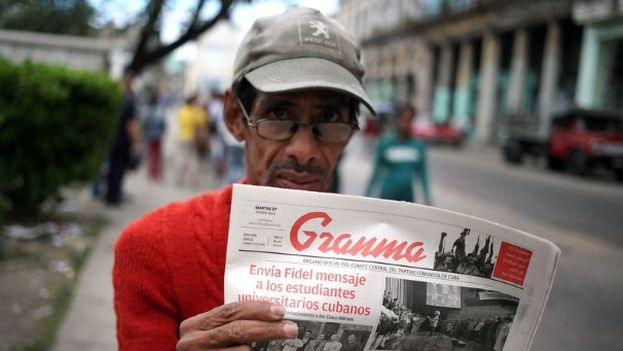
![]() 14ymedio, Reinaldo Escobar, Miami, 2 July 2016 — In October of 1988, students of the School of Journalism at the University of Havana, formulated 28 awkward questions posed to Fidel Castro at a meeting held in the theater of the Central Committee of the Communist Party in Havana. One question touched on the thorny issue of a personality cult in the media. The then all-powerful Carlos Aldana, head of the Department of Revolutionary Orientation, assured his boss that an incident of this nature would never be repeated.
14ymedio, Reinaldo Escobar, Miami, 2 July 2016 — In October of 1988, students of the School of Journalism at the University of Havana, formulated 28 awkward questions posed to Fidel Castro at a meeting held in the theater of the Central Committee of the Communist Party in Havana. One question touched on the thorny issue of a personality cult in the media. The then all-powerful Carlos Aldana, head of the Department of Revolutionary Orientation, assured his boss that an incident of this nature would never be repeated.
Nearly three decades later the militants of the Young Communist League (UJC) of the Vanguardia newspaper in Santa Clara province, bursting with bravery (or innocence) sent a letter to the Union of Cuban Journalists in which they denounced the limitations on freedom of expression experienced by information professionals, limitations that come, according to them, from “the extra-journalistic forces that investigate us in our workplaces and in the CDRs (Committee for the Defense of the Revolution); that follow our every step and call us to account for the publication of comments or controversial works.”
In addition to complaining about the censorship of the media where they are paid by the state, they exposed the declining wages of the sector and asked why it is looked on so badly if they collaborate with alternative media, which is not controlled by the political apparatus of the Communist Party.
All these militants of the UJC received, in their time, excellent grades to be able to choose the career they studied and all of them passed through an ideological filter at the time they were hired. Is it perhaps that they have been infiltrated by the counterrevolution which is trying to form a fifth column? Of course not.
What is at issue is that the “gag-love” that endures and that hardens the affection and militant discipline, focused on democratic centralism, has as its limit the individual conscience, which serves mainly to determine what is right and what is wrong and to act accordingly.
The thermometer does not decide the temperature of a body, because it is an instrument that only serves to measure it. Equally, the mechanisms of control fail to faithfully determine the level of unconditional loyalty of the troops they target, because loyalty can be focused more on ideas than on individuals and can be conditioned more by a sense of duty than by fear.
It is likely that some of these young people reproached their parents one day for their complicit silence before the mistakes made, and perhaps in their days as students they mocked the triumphalist headlines of the official press, and perhaps, in small confabs or to themselves, they promised that they would not reproduce the mold of the mask, and that when they themselves were in the newspaper newsrooms, or in the TV studios or in the booths at the radio stations, they would use what they’d learned to tell the truth, at least their truth.
It is not necessary to believe that they will join the opposition, or even that they are willing to break all ties. But what they have done is more than enough to show the cracks, the fragility of a discourse that boasts of a monolithic invincibility.
